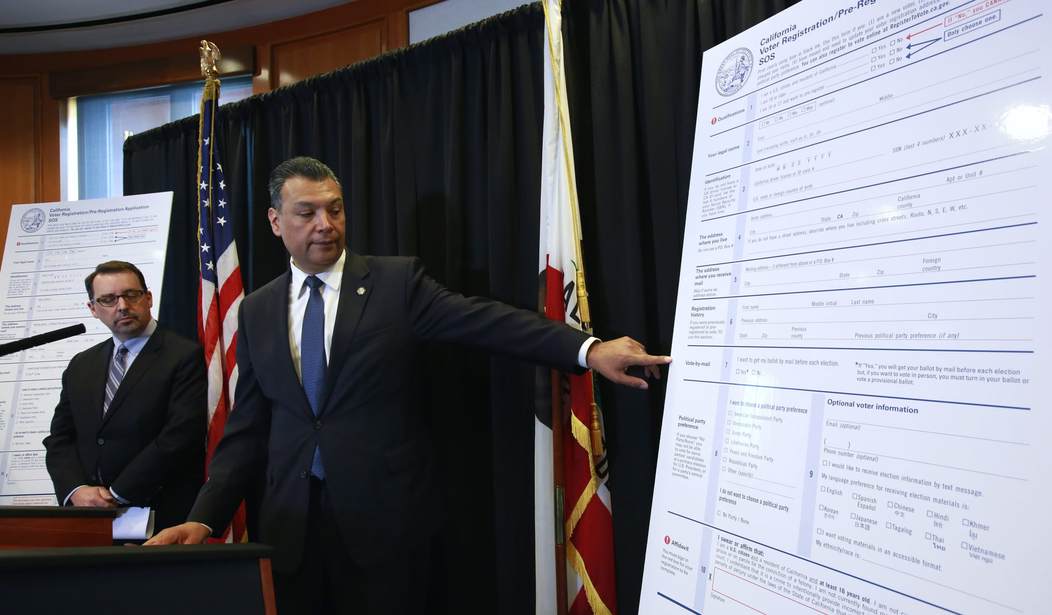California Secretary of State Alex Padilla has no doubt the Russians would hack into his state’s election system if they could.
“I operate under the assumption that hacking is actually happening and California is a target,” Padilla said to the Los Angeles Times.
“This year, there’s a big focus on several congressional races that could determine the House majority. The stakes in California have national implications,” Padilla stressed.
But the fact is, the Russians can’t break into California’s voting booths to change votes. Nobody can. The voting system isn’t hooked up to the internet, by state law. Somebody could hack into one voting machine. But there’s no way they could get into them all.
“We invited the Department of Homeland Security to try to hack into our system,” said Joe Holland, Santa Barbara County’s recorder-assessor and president of the state association of election officials. “They stayed five days and couldn’t do it.”
But still, “just because you’re paranoid doesn’t mean they aren’t after you,” as Joseph Heller wrote in Catch 22.
Maybe Padilla is not paranoid. Perhaps Padilla has just become increasingly knowledgeable about all the things that can go catastrophically wrong with an election.
For instance, what if someone, like the Russians, tried to hack into California’s registration lists? Could that be done?
The answer, according to Matt Bishop, a UC Davis computer professor, is “yes.”
“People are registered online. Records are connected to the internet. And hackers could break into those,” said Bishop. “They could create chaos by disenfranchising voters.”
So the California Legislature has approved, and Gov. Jerry Brown (D) has signed, a bill establishing the first state agency in the nation devoted to protecting the state’s elections system.
Operating under the secretary of State, the Office of Elections Cybersecurity — with an annual budget of $2 million — is tasked with working with local elections officials to “reduce the likelihood” that anyone, Russian or otherwise, can mess with “the security or integrity of elections.”
But that is only one responsibility of the new agency created with the bill signed by Brown on Aug. 28. Along with safeguarding the actual voting system and voter registration lists, the Office of Elections Cybersecurity is also charged with “counteracting false or misleading information” that could be used to keep people from voting or to cause confusion about what’s on the ballot, what times polls open, or anything that might disrupt the voting process.
In other words, the Office of Elections Cybersecurity will be in charge of policing social media, looking for what might be called “fake news.”
“Any dynamic out there that causes voter confusion is bad for voting rights and bad for elections,” said Padilla, “and we have a responsibility to address it.”
This social media monitoring mission of the new agency is a response to 13 Russian nationals being indicted in February on charges of using Facebook, Twitter and other social media platforms to confuse U.S. voters.
“The defendants waged what they called ‘information warfare against the United States,’” Deputy Attorney General Rod Rosenstein said when the indictments were released.
Whether Homeland Security could hack into the system or not, California state Assemblyman Marc Berman, the author of the legislation that created the new Office of Elections Cybersecurity, said the threats posed by Russia and any other foreigners who want to mess with U.S. elections can’t be ignored.
“Given the ongoing and increasingly sophisticated threats posed to our elections systems, it is crucial for California to take all necessary steps to defend our democracy,” said Berman.
However, that doesn’t mean the Office of Elections Cybersecurity will be given a blank warrant to play internet or social-media censorship cop. California bureaucrats are not going to be looking for political candidates who exaggerated their resumes or maybe, God forbid, lied about their opponents, Berman promised.
“You’d have to appropriate a billion dollars,” Berman said, “and you’d run into tricky First Amendment issues.”
California is the first to set up this kind of an agency. However, it isn’t the only state where bureaucrats and politicians are worried about the integrity of their elections systems.
“The spreading of misinformation and disinformation is one of the single greatest threats to our democratic process,” said National Association of Secretaries of State President Jim Condos, a Democrat who is also Vermont’s secretary of state.
“As we saw in 2016, our foreign adversaries used these tactics to sow doubt with voters and weaken voter confidence in the integrity of our elections,” Condos added.
So now it’s going to be full-speed ahead with legislatures and secretaries of state briskly following California’s example, right? Probably, not. After all, there’s only one California.
“Cybersecurity and election integrity are top priorities, and something we think about and work on every single day,” Eric Covey, a spokesman for the National Association of Secretaries of State, told Governing. “But the reality is that most states do not have the resources that California has to do something as grand in scope.”









Join the conversation as a VIP Member